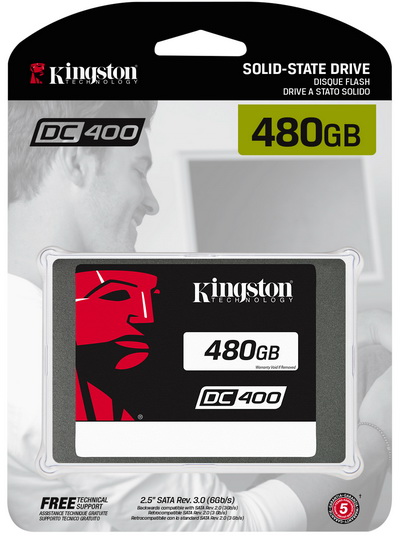INTRODUCTION

With the new PCIe M.2 NVMe SSD solutions stealing the spotlight lately due to their surprisingly faster speeds (up to 4 times faster) compared to regular SATA models (we all know that the SATA III standard has been maxed out for years) most enthusiasts and professionals seem to turn towards the first in order to cover their needs. Still SATA based SSDs will probably hold the largest market share for at least a few more years since unlike M.2 models they can be used in pretty much any SATA compatible desktop and laptop system even models that date as far back as when the SATA II standard was first introduced in 2004. Manufacturers like Kingston are well aware of this fact so they haven't stopped introducing new SATA III SSD models in the market like the enterprise-class SSDNow DC400 480GB which we'll be testing today.
Kingston Technology Company, Inc. is the world’s largest independent manufacturer of memory products. Kingston designs, manufactures and distributes memory products for desktops, laptops, servers, printers, and Flash memory products for PDAs, mobile phones, digital cameras, and MP3 players. Through its global network of subsidiaries and affiliates, Kingston has manufacturing facilities in California, Taiwan, China and sales representatives in the United States, Canada, Europe, Russia, Turkey, Ukraine, Australia, New Zealand, India, Taiwan, China, and Latin America.
Kingston markets the SSDNow DC400 line of solid state drives as entry level data center (enterprise) models (currently available in 480/960/1600GB - 400/800/1800GB models featuring higher IOPS performance are also available as special orders) so leaving out the quite important 5 year warranty you can obviously also expect high reliability (the 480GB model is rated for 257TBW/Terabytes Written - 0.30DWPD/Drive Writes Per Day) and performance. Inside the DC400 we find 15nm MLC NAND flash paired with 512MB DDR3L-1600 cache and the PHISON S10 (PS3310-S10) quad-core 8-channel NAND flash controller which comes with a complete feature-set including as TRIM, end-to-end data path protection (ETEP), advanced wear-leveling, advanced garbage collection, smart ECC, native command queuing (NCQ), smart refresh, guaranteed flush technology, smart flush technology and firmware-controlled power loss management.

 O-Sense
O-Sense







.png)

